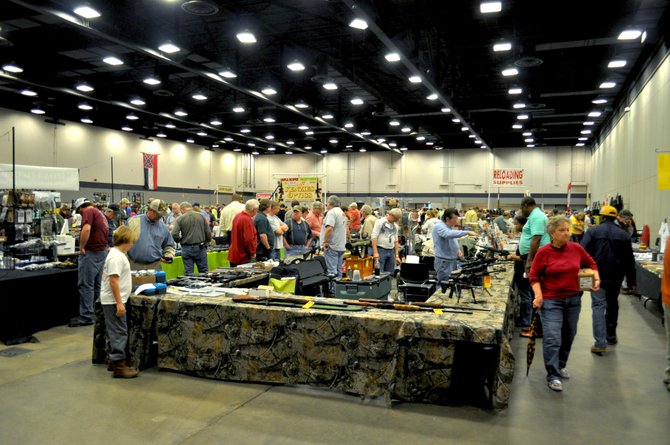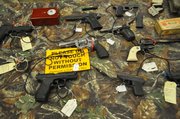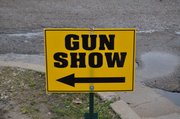A gun vendor displays his wares to Mississippians at the Jackson Gun Show that took place Jan. 12 and 13 at the Trade Mart Building. Organizers estimated that the turnout hit record numbers; some attendees waited in line for hours just to get in. Photo by Trip Burns.
Mississippians with a yen to add to their personal arsenals can head out to a gun show in the state just about any weekend of the year. A quick review of the MississippiGunShows.com website Jan. 4 listed 52 shows in 2013, with 11 in Jackson alone--one every month except June.
Gun shows have proliferated in the United States since 1986, when Congress passed the Firearm Owners Protection Act. That law reversed a section in the Gun Control Act of 1968 that prohibited firearms dealers who hold a Federal Firearms License to sell guns anywhere but their registered address. After passage of the FOPA, dealers could take their "stores" on the road.
The so-called "gun-show loophole" takes these shows--which numbered more than 5,000 in 2005--to a whole new level. Under federal law, retailers, manufacturers and others who sell guns as a business must be licensed. Licensed sellers must perform background checks on the people who buy guns from them and keep records of their sales, though records of background checks must be destroyed after 24 hours.
Hobbyists, collectors and others who only make occasional sales are exempt from either performing background checks or keeping records of who buys their guns.
These "private" sellers make up an estimated 25 percent to 50 percent of sellers at gun shows. No background check on purchasers makes it easy for anyone to buy guns, even those who can't pass a check and are legally prohibited from owning firearms, such as convicted felons.
The federal Bureau of Alcohol, Tobacco, Firearms and Explosives' lack of adequate resources to enforce gun laws makes buying guns at gun shows even easier. The ATF monitors, at most, 2 percent of gun shows nationally. The bureau hasn't had a permanent director in six years; the U.S. Senate, which hasn't brought a nomination up for a vote in that time, must confirm nominees for the position. The department's budget has been nearly stagnant for a decade, as has its staffing levels.
A spider's web of laws further hampers the bureau's effectiveness. For example, the agency cannot maintain a database of firearms, making tracing and determination of gun ownership a tedious, manual process when a firearm has been used in a crime.
Between the legal loopholes and lack of regulation and enforcement, gun shows have become sales bonanzas for those who are either unable or unwilling to sell or buy firearms legally. Few states have laws that govern gun shows, and Mississippi isn't one of them. The exhibitor registration form for the Jackson Gun Show, which holds three shows in the Mississippi Trade Mart annually, asks for minimal information, which doesn't include whether the exhibitor is a federally licensed dealer.
Gun shows are the second-leading source of crime guns recovered in firearms trafficking investigations nationwide, behind only corrupt federally licensed dealers, reported the ATF in "Following the Gun: Enforcing Federal Laws Against Firearms Traffickers," published in June 2000. In 2005, Canada's Criminal Intelligence Service called unregulated American gun shows a "serious threat." And a study from the University of Oxford in 2002 estimated that 80 percent of Mexico's illegal firearms are imported from the United States.
The Virginia Center for Public Safety has determined that background checks work to keep firearms out of the hands of criminals. In 2005, licensed dealers doing back-ground checks prevented 2,668 illegal gun sales. The Virginia Tech Review Panel recommended closing the so-called "gun-show loophole" to its state legislature.
"Gun shows provide a large mar-ket where crimi-nals can shop for firearms anonymously. Unlicensed sellers have no way of knowing whether they are selling to a violent felon or someone who intends to illegally traffic guns on the streets to juveniles or gangs. Further, unscrupulous gun dealers can use these free-flowing markets to hide their off-the-book sales," wrote the authors in "Gun Shows: Brady Checks and Crime Gun Traces" in 1999. The report was a joint effort of the U.S. departments of the Treasury and Justice in cooperation with the ATF.
"While most gun-show sellers are honest and law-abiding, it only takes a few to transfer large numbers of firearms into dangerous hands," the report concluded.





Comments